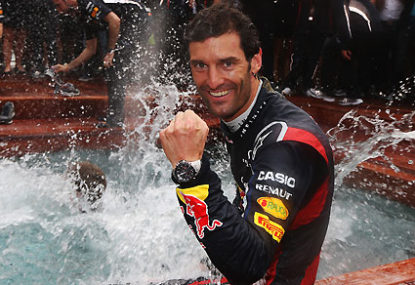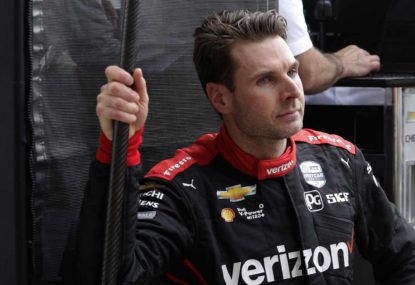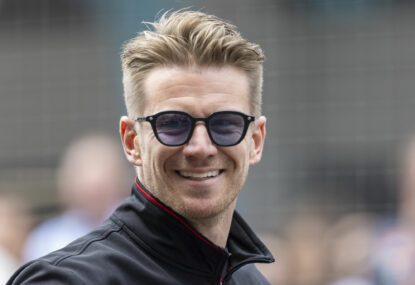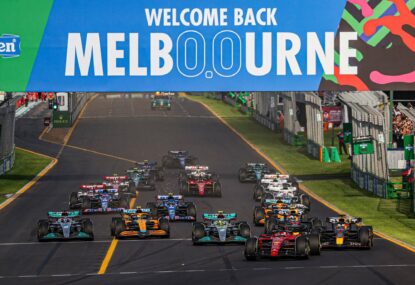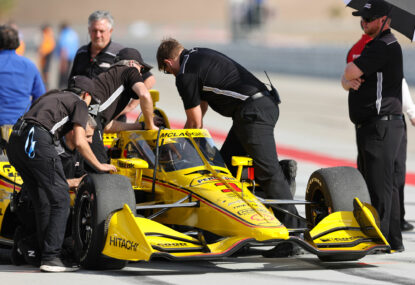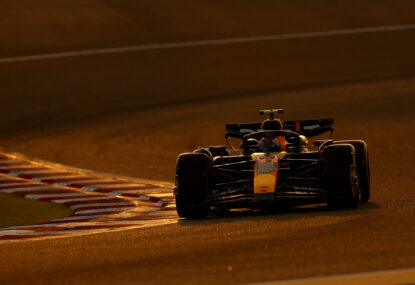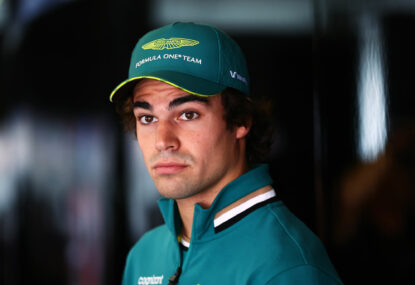The curtain has drawn on Mark Webber’s Formula One career and while he may have never won the prestigious World Championship title, he will be remembered as one of the greatest battlers this sport has to offer.
Webber’s illustrious career, which spanned just over a decade, came to an end at the Brazilian Grand Prix when he finished second behind Red Bull teammate and four-time world champion Sebastian Vettel, who recorded a ninth consecutive victory as his phenomenal era in Formula One continued.
Webber’s career has been filled with many highs and lows, but in this article, I want to focus on the highs, as this is supposed to be a celebration of one of Australia’s greatest sportsmen.
It started way back in 2002 at his national race, the Australian Grand Prix at Albert Park in Melbourne.
Racing for Minardi as part of a three-race contract which was eventually extended, Webber qualified fifth-slowest (out of 22 cars), more than four seconds away from Rubens Barrichello, who qualified for pole position.
What eventuated would be one of the most controversial Australian Grands Prix in history.
Eight cars were involved in a multi-car pile-up at the first corner of the race, thus ending their races barely before it had even started. Four further cars were forced out due to other varying reasons, and two more cars were disqualified for breaching the rules.
Barrichello, Felipe Massa and future World Champion Jenson Button were among the most notable names involved in that crash.
Webber’s Minardi was one of eight cars that would eventually finish the race, and he would cross the checkered flag fifth, not a bad effort for a then 25-year-old on debut.
Germany’s Michael Schumacher would win the race, on his way to claiming his fifth (of seven) World Championship title, and his third consecutive.
Until Sebastian Vettel’s current dominance, Schumacher could have been seen as one of the greatest Formula One champions Germany has ever produced.
What followed for Webber would be a few quiet years until, at the 2005 Monaco Grand Prix, he achieved his first podium finish, crossing the finish line third behind Kimi Raikkonen and then-Williams teammate Nick Hiedfeld.
During this time, the highest he was able to finish in a season was 10th, in 2003 and 2005, and his points haul of 36 was his then-best, achieved in the latter year.
That would be his most notable result until the 2007 European Grand Prix, when he again finished third behind Fernando Alonso and Felipe Massa. It was that year in which he joined Red Bull Racing after stints at Minardi, Jaguar and Williams.
It wouldn’t be until the 2009 German Grand Prix when, at the age of 32, and after a hat-trick of second-place finishes earlier in the season, he would achieve his first pole position and race win, the first for an Australian in either category since Alan Jones in 1980 and Sir Jack Brabham in 1981 respectively.
The race victory almost didn’t happen though, as Webber was given a drive-through penalty for colliding with Rubens Barrichello in a mostly-avoidable collision in the first lap of the race.
By the time he took his first pit stop on lap 19, he had slipped to eighth, but reclaimed the lead with over half the race distance to go and went on to claim a well-deserved maiden Formula One victory.
This historic event made headlines in Australia, with many media outlets leading their bulletins with his historic race victory and also being included among the front pages of some News Limited-produced newspapers.
It would prove to be the catalyst to him becoming a regular fixture among the prominent names of Formula One racing today; three months after claiming his first race victory in Germany, he would achieve another victory in Brazil, the same race where Jenson Button claimed his so-far solitary World Championship title by virtue of a fifth-place finish.
A second place finish in Abu Dhabi would see him record his best Formula One season since debuting in 2002, finishing fourth with 69.5 points and with two race victories, both the first of his career.
As good as his breakthrough in 2009 was, 2010 saw the start of even better results for the Australian.
From 19 races, of which 17 were completed, his worst finish was ninth, which, coincidentally, happened to be his home Championships at Albert Park in Melbourne.
He was also able to achieve ten podium finishes, four of which he won, including the prestigious Monaco Grand Prix, which is considered by many to be “the Wimbledon of Formula One racing”.
For most of the season, he was in pole position to claim his first World Championship title, but a careless crash in Korea, which he entered with a 14-point lead over Fernando Alonso in the championship standings, saw him lose the lead to the Spaniard.
After finishing second in the penultimate race of the 2010 season in Brazil, it was then down to the final race of the season in Abu Dhabi, which would decide the World Championship title.
The occasion would prove to be too much for Webber, as he would cross the line eighth, well behind the main contenders for the title. He would end up finishing third behind Red Bull Racing teammate Sebastian Vettel and Fernando Alonso with 242 points.
Although 2011 saw only one race victory (in the very final race of the season, in Brazil), the season was still one of consistency for the Australian, with his worst finish being fifth (in Australia and Hungary) in 18 completed races.
He again managed ten podium finishes, including his sole race victory at the end of the season, and accumulated 258 points, his best in a season.
2012 saw Webber start the season with four consecutive fourth-place finishes, including his best ever result in Australia, where, as evidenced by his results over the past decade, he is known to crumble under pressure in the same way Samantha Stosur struggles in front of her home crowds at the Australian Open tennis.
In fact, 2007 (13th), 2010 (9th) and 2011 (5th) saw Webber record his worst results for those seasons at his home circuit at Albert Park (retirements do not count).
He was able to claim two race victories during the season, including sophomore efforts in Monaco (where a penalty involving Michael Schumacher at the preceding Spanish Grand Prix was the catalyst) and Great Britain, but those would be the last of nine race victories the Australian would enjoy.
By winning Monaco, Webber became the only Australian to win at the prestigious circuit more than once, and his victory marked the first time that six different drivers had won the first six races of a season.
His performances in 2012 were significantly down on the last few years; he could only manage four podium finishes, seven times less than the last three seasons combined, recorded his worst ever result in Italy when he finished 20th out of 24 cars (actually, he had retired due to a problem with his tyres), and finished sixth with 179 championship points.
And so we come to 2013, Webber’s final season in Formula One racing, before he is replaced as Sebastian Vettel’s partner-in-crime by compatriot Daniel Ricciardo at Red Bull Racing.
Though he was unable to record a race victory in a season for the first time since 2008, it was again another consistent year for Webber, as his Red Bull teammate Vettel continued to dominate on the circuit.
Eight podium finishes, twice as much than last season, were enough to see him once again finish third in the championship standings with 199 points behind Vettel and Fernando Alonso.
His moderately successful Formula One career drew its curtains on the weekend, when he finished second (for the fourth time in the season) behind Vettel in Brazil, one of three circuits (the others being Monaco and Great Britain) where he has triumphed twice.
He will now race for Porsche in the FIA World Endurance Championship, as Daniel Ricciardo takes the hot seat alongside Sebastian Vettel, who will shoot for five consecutive World Championship titles next year.
Looking back, should Mark Webber be considered as a great or an underachiever?
It would be harsh to label Webber an underachiever, despite his struggles in Australia and given how far he had come prior to triumphing at the German Grand Prix in 2009.
But undoubtedly, as he was entering his career peak, he remained stuck behind the shadow of his more successful Red Bull partner-in-crime, Vettel, as well as established racers Fernando Alonso, Lewis Hamilton and Jenson Button.
However, he will go down as one of the greatest Formula One racers Australia has produced behind Sir Jack Brabham (who now jointly holds the record for most pole positions by an Australian) and Alan Jones (who was the last Australian to win a Grand Prix race back in 1981 until Webber’s victory in Germany 28 years later).
And while he was never able to win that elusive World Championship title, he was part of the Red Bull team that, aided by Vettel’s four consecutive titles, have also dominated the constructors’ championships, winning the last four.
Now, in the post-Webber era, Daniel Ricciardo will stand as our only hope of future success in Formula One racing, and there is no doubt that he will one day become one of the most prominent names of the sport.
Partnering Sebastian Vettel as part of the most successful constructor of the last four years, in addition to filling Webber’s shoes, should put the young Ricciardo in good stead for 2014.
And thus, the future of Australian Formula One racing is in good hands. Or is it?





























































































